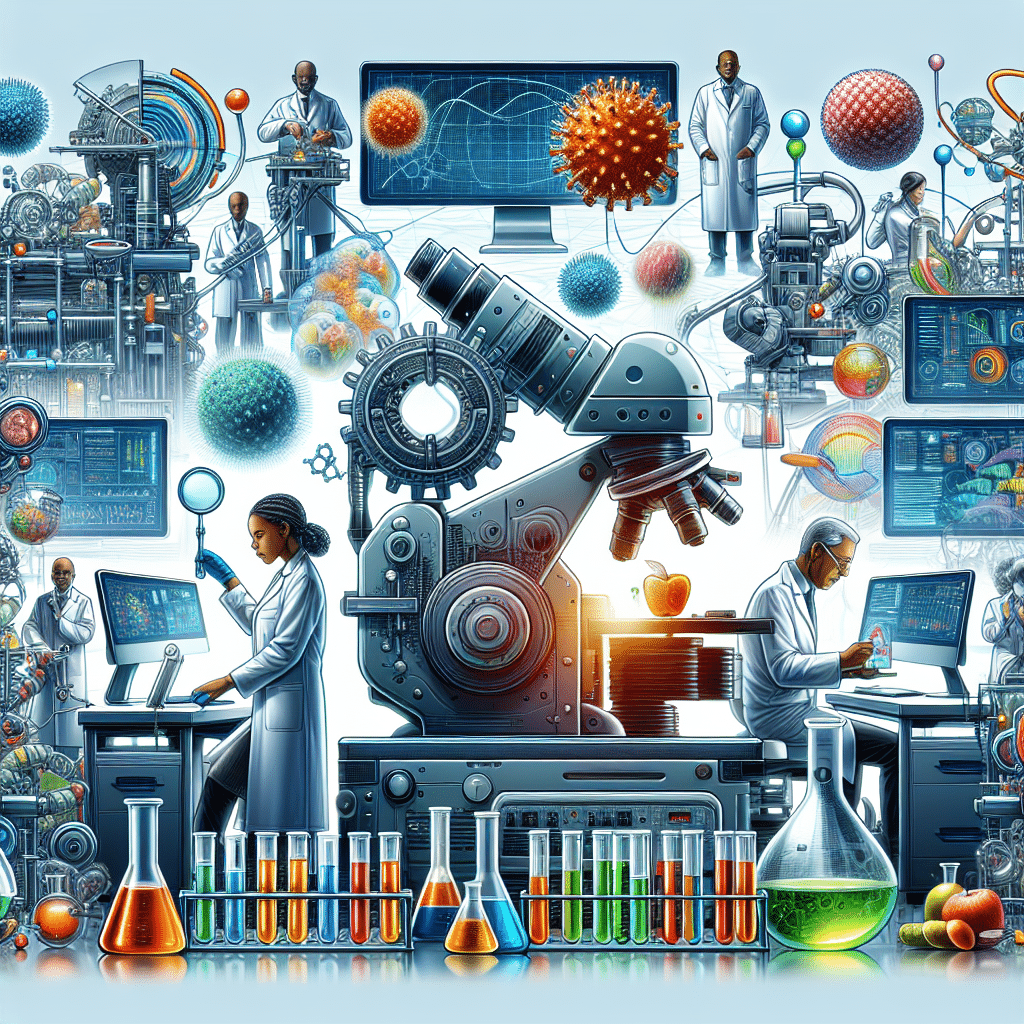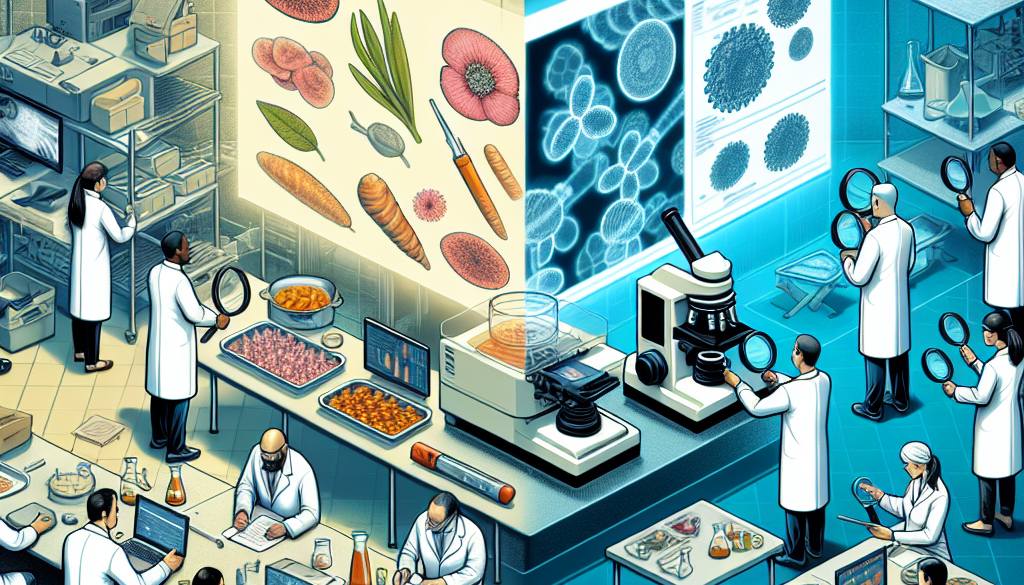The Impact of Technology on Food Safety Testing
-
Table of Contents
- Technology’s Role in Enhancing Food Safety Testing
- The Evolution of Food Safety Testing
- Advancements in Detection Technologies
- Improving Traceability with Blockchain
- Big Data and Predictive Analytics
- Impact on Public Health and Industry
- Challenges and Future Directions
- Conclusion
- ETprotein’s Commitment to Food Safety
Technology’s Role in Enhancing Food Safety Testing

Food safety is a critical concern for consumers, producers, and governments worldwide. As the global food supply chain becomes more complex, the importance of ensuring the safety and quality of food products has never been more paramount. Technological advancements have revolutionized the field of food safety testing, providing more efficient, accurate, and rapid methods to detect potential hazards in our food. This article explores the impact of technology on food safety testing and how it contributes to protecting public health.
The Evolution of Food Safety Testing
Historically, food safety testing relied on traditional microbiological methods that were time-consuming and often required several days to yield results. These methods, while effective, posed challenges in terms of the speed of detection and response to potential outbreaks of foodborne illnesses. However, with the advent of new technologies, the landscape of food safety testing has undergone a significant transformation.
Advancements in Detection Technologies
Recent technological innovations have led to the development of faster and more sensitive detection methods. Here are some key advancements:
- PCR Technology: Polymerase Chain Reaction (PCR) technology has greatly improved the speed and accuracy of pathogen detection. PCR can amplify small amounts of DNA from a pathogen to detectable levels within hours, enabling rapid responses to contamination.
- Next-Generation Sequencing (NGS): NGS allows for the comprehensive screening of food samples for all known pathogens simultaneously. This technology not only identifies known foodborne pathogens but also uncovers new strains and sources of contamination.
- Biosensors: Biosensors are analytical devices that convert a biological response into an electrical signal. They are used for detecting various contaminants, including pathogens, toxins, and allergens, with high specificity and sensitivity.
Improving Traceability with Blockchain
Blockchain technology has emerged as a powerful tool for enhancing traceability in the food supply chain. By creating a secure and immutable ledger of transactions, blockchain enables all stakeholders to track the journey of food products from farm to table. This level of transparency helps in quickly identifying and isolating contaminated products, thereby minimizing the risk of widespread outbreaks.
Big Data and Predictive Analytics
The integration of big data and predictive analytics in food safety testing is a game-changer. By analyzing large datasets, food safety experts can identify patterns and predict potential outbreaks before they occur. This proactive approach to food safety can lead to more targeted and effective interventions.
Impact on Public Health and Industry
The impact of technology on food safety testing is profound, with significant benefits for public health and the food industry:
- Enhanced Consumer Confidence: Improved food safety testing methods result in safer food products, which in turn boosts consumer confidence in the food supply.
- Reduction in Foodborne Illnesses: Rapid detection and response to food safety threats can significantly reduce the incidence of foodborne illnesses.
- Economic Benefits: By preventing foodborne disease outbreaks, technology in food safety testing saves the industry and healthcare systems billions of dollars annually.
- Global Compliance: Advanced testing methods help food producers meet the stringent safety standards required by international markets, facilitating global trade.
Challenges and Future Directions
Despite the advancements, there are challenges that need to be addressed, such as the high cost of advanced testing technologies and the need for skilled personnel to operate them. Moreover, as pathogens evolve, there is a continuous need for the development of new testing methods.
The future of food safety testing lies in the integration of various technologies, such as artificial intelligence (AI) and machine learning, to further enhance the speed, accuracy, and predictive capabilities of food safety testing protocols.
Conclusion
Technology has had a transformative impact on food safety testing, offering tools that are faster, more accurate, and more efficient than ever before. These advancements not only protect consumers but also provide numerous benefits to the food industry, including improved compliance and economic savings. As technology continues to evolve, we can expect even greater improvements in our ability to ensure the safety of our food supply.
ETprotein’s Commitment to Food Safety
In line with the advancements in food safety testing, ETprotein company is dedicated to providing high-quality protein products that meet the highest safety standards. Their protein offerings, including organic rice protein, pea protein, and various seed proteins, are produced with a commitment to non-GMO, allergen-free attributes, and high purity levels. ETprotein’s products are an excellent choice for manufacturers who prioritize food safety and quality in their offerings.
About ETprotein:
ETprotein, a reputable protein and L-(+)-Ergothioneine (EGT) Chinese factory manufacturer and supplier, is renowned for producing, stocking, exporting, and delivering the highest quality organic bulk vegan proteins and L-(+)-Ergothioneine. They include Organic rice protein, clear rice protein, pea protein, clear pea protein, watermelon seed protein, pumpkin seed protein, sunflower seed protein, mung bean protein, peanut protein, and L-(+)-Ergothioneine EGT Pharmaceutical grade, L-(+)-Ergothioneine EGT food grade, L-(+)-Ergothioneine EGT cosmetic grade, L-(+)-Ergothioneine EGT reference grade and L-(+)-Ergothioneine EGT standard. Their offerings, characterized by a neutral taste, non-GMO, allergen-free attributes, with L-(+)-Ergothioneine purity over 98%, 99%, cater to a diverse range of industries. They serve nutraceutical, pharmaceutical, cosmeceutical, veterinary, as well as food and beverage finished product distributors, traders, and manufacturers across Europe, USA, Canada, Australia, Thailand, Japan, Korea, Brazil, and Chile, among others.
ETprotein specialization includes exporting and delivering tailor-made protein powder and finished nutritional supplements. Their extensive product range covers sectors like Food and Beverage, Sports Nutrition, Weight Management, Dietary Supplements, Health and Wellness Products, and Infant Formula, ensuring comprehensive solutions to meet all your protein needs.
As a trusted company by leading global food and beverage brands and Fortune 500 companies, ETprotein reinforces China’s reputation in the global arena. For more information or to sample their products, please contact them and email sales(at)ETprotein.com today.












